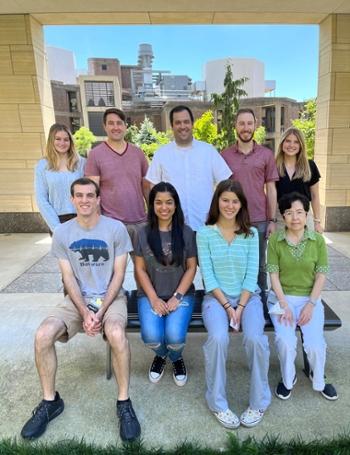Alejandro Pezzulo, M.D.
Associate Professor of Internal Medicine
Pulmonary, Critical Care & Occupational Medicine
Director, University of Iowa Cells and Tissue Core
Director, CF Foundation Iowa RDP Bioinformatics
University of Iowa Carver College of Medicine & Iowa City VA Medical Center

Three statements about you – two true, one false.
- I played guitar in a metal band in high school.
- I know almost nothing about soccer and baseball, the two most popular sports where I grew up.
- I was a math wizard, which is why I now do bioinformatics.
Give us your ‘elevator pitch’ biography.
I was born in Caracas, Venezuela and was raised by the most loving and supportive family one can imagine. I was the first person in my family to go into medicine after a school counselor told me it was my fate (she was right). I didn’t really love medicine until, in a career-shifting event, Dr. Roberto Sanchez de León recruited me to his pulmonary physiology lab. Despite running a meagerly equipped and funded lab (as most labs in Venezuela are), his wit, passion, and curiosity allowed him to reach an unheard-of success rate as a mentor. All of us that trained with him are still physician-scientists in one way or another... He left us too soon, but his legacy continues.
I wasn’t sure I could make it in science until my second career-shifting event: meeting Joe Zabner. Joe was the first med student to train under Roberto, who thought we would get along, so he sent me to Iowa City for a summer. My life has not been the same since. After med school, I moved to Iowa to work with Joe and the cystic fibrosis group (Mike Welsh, Dave Stoltz, Paul McCray, and many others). I could go on and on about the amazing experience of working with Joe and the group, all I’ll say is that in the span of just a few years, I got to work with fruit flies, mice, pigs, humans, and databases, learned how to run a lab, discovered new mechanisms, and saw almost first-hand how cystic fibrosis went from being incorrectly explained in medical textbooks to being highly treatable, in part due to the work of my mentors. Joe opened his lab and his home to me and many others in a similar boat, and thanks to him there is no better place than Iowa to grow in this career path.
After a few years, I completed Internal Medicine and Pulm/CCM fellowship in the Iowa Physician-Scientist Training Program, this helped me open my epithelial biology lab just in time for the pandemic; however, thanks to my mentors and my luck in recruiting amazing trainees, my lab has grown in size, scope, and funding. I only hope I am half as successful as my mentors in advancing medicine!
The most important thing in my life also happened in Iowa: I met Emma (now my wife, and, unlike me, a real scientist). We have two amazing children, and now get to live just a few blocks away from both her parents and my parents, who moved to Iowa after finding out they’d have grandchildren. My elevator pitch is: I may be the luckiest guy in the world, and I haven’t worked a day since I finished medical school.
What would you tell yourself as an Early Career Professional?
I often go back to what I call “Zabnerisms”, things my mentor says/do that stuck with me and have helped my career enormously:
- Be Curious: have a clear scientific direction yet explore. The best results are often the opposite of the expected ones. Learn from them.
- Be Bold: our goal as scientists is to put ourselves out of business as clinicians. Mike Welsh (cystic fibrosis) is a good example of this!
- Be Nice, and Help Others: the people you meet on your way up are the same people you meet on your way down.
- Learn How to Say No: Joe asked me to first say “maybe” and then direct to him anyone requesting work I don’t like. I think he’ll eventually ask me to stop. :)
- Enjoy the Ride: the worst thing that could happen if my science fails, is to go back to full time clinical practice, which I also love. I am very fortunate.
- People First: the most lasting collaborations and the most productive teams require really getting to know people.
If you weren’t in medicine, and were in a different industry altogether, what would you be?
I’d be a writer or investigative reporter. Besides the natural sciences, I love history, politics, and economics, so probably one of those areas.
What is your favorite way to spend a day off?
If not doing something fun with my family, I’m probably making electronic music that no one should ever listen to.
What areas of medicine are you most excited to see develop?
I love when scientific knowledge advances to turn syndromes into mechanistic disease definitions. From a therapeutics standpoint, I was thrilled about the convergence of scientific advances at the right time during the pandemic: the silver lining was how, under the right economic and academic incentives, genome sequencing, bioinformatics, and oligonucleotide synthesis were ripe enough to enable RNA vaccines. This could come in handy during the next pandemic, whatever it might be.
What is one advancement in your field you’d like to see in your career?
Discovery of druggable mechanisms to control or revert chronic inflammation and fibrosis, in any organ.
Which statement did you make up?
The last one. I almost failed high school math, you could call me a “late bloomer.” By the way, I’m a terrible guitar player (glad I stayed in medicine), but my dear high school bandmate - Demian Arriaga - is extremely talented and went on have an outstanding career and to play with international rock and pop stars. Go check him out!